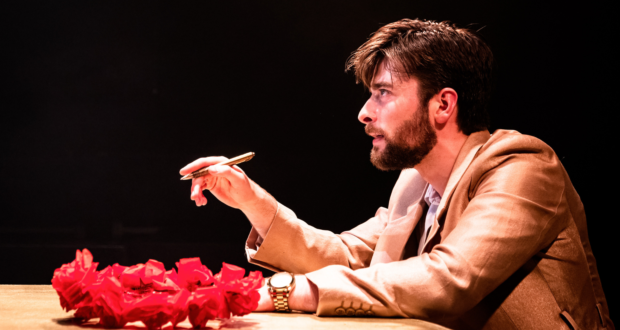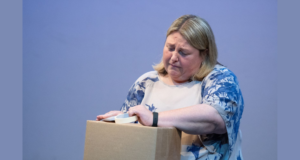Oscar Wilde’s biblical epic gets a bit of a twist.Summary
Rating
Good
According to their mission statement, Lazarus Theatre Company are all about “reinvestigating, revitalising and reimagining” classic works. To this end we’re being treated to a male Salomé and the promise/threat of “full male nudity”, so I went in intrigued as to how exactly this interpretation would apply those Three R’s to this ancient tale of lust and power. With the original 1894 production famously banned on blasphemy grounds – you weren’t allowed to portray biblical characters sexually back then – how would Lazarus pitch the story to a modern audience?
The plot concerns King Herod, his wife Herodias, her son Salomé, and the prophet John the Baptist (aka Jokanaan). Salomé (gold-glittered Fred Thomas) conceives a passion for Jokanaan (doomy shouter Prince Plockey) but the feelings aren’t mutual. Then Herod (intense party boy Jamie O’Neill) commands Salomé to dance for him, with the enticement of whatever he wants in return, up to half of Herod’s kingdom. But when Salomé agrees to the deal and requests Jokanaan’s head on a platter as his reward, Herod is horrified and attempts to renege on the bargain.
It must be pointed out that this is not the witty, fun Oscar Wilde of The Importance of Being Earnest. The style here is sombre and lyrical – more akin to Wilde’s short fairy tales. The playing is dead serious, and there are about a million descriptions of the moon – which yields one of this straight-faced production’s best laughs when Herodias (angry Pauline Babula) responds to the umpteenth “Behold the moon! Doesn’t she look like -?” with a terse “No. The moon looks like the moon. That’s all.”
Herodias has been bad-mouthed by Jakanaan, and so stands steadfastly – in fact, rather furiously – behind her son’s murderous demand for the prophet’s head. It’s in this final section that the play’s themes come to their most satisfactory dramatic heat. As a terrified Herod offers more and more extravagant alternatives to Salomé’s gruesome request, O’Neill sells the King’s mounting desperation very effectively, with Salomé’s flat rejection of each plea feeling increasingly cruel, and his mother’s encouragement gloatingly vicious. The denouement of the action is suitably bleak and bloody.
There’s an active sound design and plenty of smoke and wind to stoke up a whiff of melodrama. The traverse staging fits snuggly into the smaller of Southwark Playhouse’s studios, and Wilde’s rendition of the New Testament story is efficiently told. But has it really been reinvestigated/ revitalised/ reimagined? The dance of the seven veils – the play’s usually central set-piece – becomes a coy frolic. Is putting a man in a flouncy frock really the most transgressive update imaginable in 2021? And willy-watchers will be disappointed to find no “full nudity” after all. I’d love to see Lazarus adopt a bolder interpretation of their manifesto, but for now this is actually a rather traditional take on a story that has much more potential than is being tapped here.
Written by: Oscar Wilde
Directed by: Ricky Dukes
Produced by: Lazarus Theatre
Salomé plays at Southwark Playhouse until 11 September. Further information and booking via the below link.
 Everything Theatre Reviews, interviews and news for theatre lovers, London and beyond
Everything Theatre Reviews, interviews and news for theatre lovers, London and beyond



